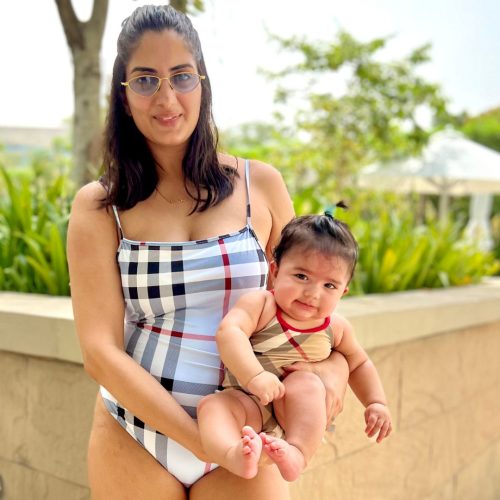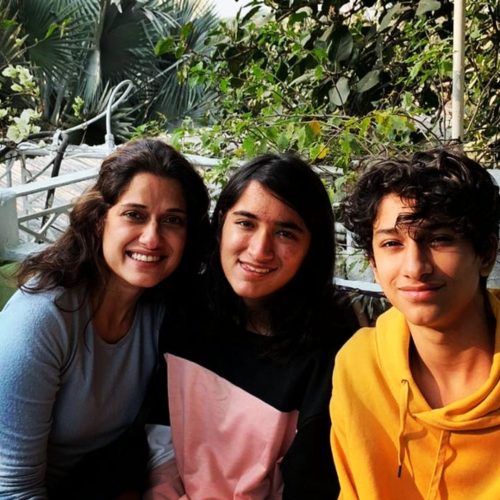- Culture & Travel
Is ‘Maternal Instinct’ Just Fake News?
- ByDiya J Verma

Lawyer-turned-creator and sustainability advocate, Sanjana Rishi, with her daughter, Amira.
Our forebears—and the nosy neighbour whose daughter-in-law is with child—have us believe that all women are inherently driven to become mums. Armoured with mum-appropriate prowess, we dare not take the road less travelled, for it infringes upon the prevailing narrative of motherhood. An instinct, is it? Or do mothers, too, learn on the job? A 2018 study postulates that feelings of affection towards your little one develop several days after labour, with some women struggling to experience the joys of motherhood even months later.
“The notion of ‘maternal instinct’ is a bit exaggerated,” explains Dr Glossy Sabharwal, Fetal Medicine and Women’s Health Specialist at Jeewanmala Hospital and Apollo Spectra. “New mothers brave complex hormonal changes that prime them for care-taking. For instance, oxytocin, the ‘love hormone’, encourages bonding between the mum and the child—where the former receives cues from her baby rather than having to solely rely on an innate sense of her infant’s needs.”
A case study by Robson & Kumar in 1980 revealed that as many as 40 percent of first-time and 25 percent of second-time mothers recall having felt initial indifference when holding their babies. Another interpretative analysis concluded that dissonance between “a woman’s expectations concerning her imagined, unborn child and its birth and early phases of life, may initiate a deeply felt struggle or sense of inability to love her newborn”. In such a case, a trinity of self-acceptance, professional intervention, and a profound understanding of cultural norms may offer respite from feelings of guilt and helplessness.

Then there are those who contend that the ‘maternal instinct myth’ is largely perpetuated by men. By offloading a hefty chunk of care-taking on the mother, owing to her ‘tenderness’ and so-called innate behaviour pattern, men can, perhaps, shirk fatherhood responsibilities. This stark image of the ‘selfless mother’ has been sold in the name of science since time immemorial—serving as a cogent distraction from what the reality may actually be.
“From an evolutionary standpoint, the idea that mums are biologically programmed and telepathically bonded to a baby, or that women should yearn for motherhood, is unhealthy, and not backed by science,” lawyer-turned-creator and sustainability advocate Sanjana Rishi puts forth. She adds, “In fact, it is a dangerous assumption, both for new mothers who experience a paucity of ‘love at first sight’, and for fathers who leverage this common perception for their own mediocrity.”
Sanjana, though, confesses that she always wanted to become a mother. “It’s safe to say that I’m entirely obsessed with my baby—I am protective of her and feel fulfilled with our bond. That said, my ‘maternal instinct’ is largely the result of conditioning and my inherent nature; I’m not certain it exists for all women. It’s funny how I didn’t experience a gush of emotion when my daughter, Amira, was born. I was overwhelmed, numb from the waist down, rapidly losing blood, exhausted from 24 hours of labour, and desperately trying to breastfeed. I felt physically and emotionally drained for the first few months. I’m grateful for my mother, whose ‘maternal instinct’, if you may, kicked in at the time. She stepped in and provided for me and my baby,” Sanjana recalls.

and felt emotionally and physically drained for the first few months.
Have you heard of the ‘parental brain’? While it is said that fluctuations in female hormones can prompt maternal sensitivity towards infant cues, scientific claims posit that changes occur in the paternal brain, too. And on account of a dearth of research, the maternal hormonal effect is emphasised—with a whopping 40 to 50 percent of the mother’s attachment to her child being governed by her hormonal constitution.
These findings pose pertinent questions: Is maternal sensitivity a switch? How does one know if they’re cut out to embrace parenthood? When will you be ready? Besides, is anyone ever ready for what comes with motherhood? Actor, director, and stage producer Vidusshi Mehra makes a compelling case for maternal instinct. “When I learnt about my pregnancy, I became highly intuitive… Harnessing the power of my maternal instinct, I wished to fiercely protect my kids. Upon setting foot into motherhood, every decision and choice begins to be made keeping your child in mind. My twins were, are, and will always be my priority.”

Dr Glossy concludes that there aren’t any preset rules when it comes to motherhood. “You won’t find a rulebook on how to parent, and it’s absolutely normal to not experience an attachment to your unborn child. Once born, holding your baby close to your body—referred to as ‘kangaroo care’—can help elevate oxytocin levels. This powerful hormone will facilitate the desire and motivation to care for your newborn.”
READ MORE
- Hyderabad Welcomes a Luxurious, New Residential Community With Signature Estates
- The Word. and Bumble Celebrated An Evening Of Scent, Sparks, and Mutual Connections
- How The Bicester Collection Quietly Became the Fashion Insider’s Best-Kept Shopping Secret
- Gauri Khan, On Her New Experience Centre In Delhi, Her Favourite Spot At Home, and Great Décor Advice
- With IRTH’s New Store in Noida, The Brands Adds To Its Joyful Delights





